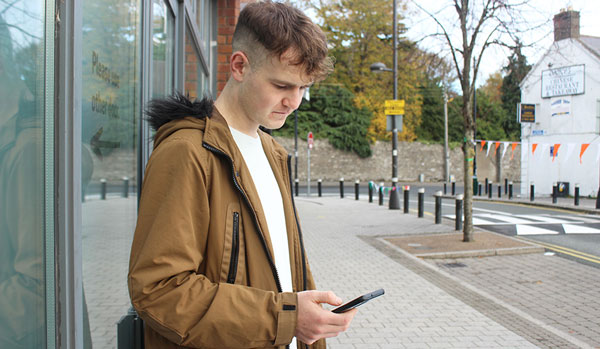Online mental health support
Online mental health support
Saturday, 09 October 2021
Many face-to-face mental health services are now offering support through text, telephone or video-based platforms.
Technology provides great opportunities. But, it can feel daunting connecting with a clinician or counsellor in a new format. There are a few things to bear in mind if you access online therapeutic support or online counselling.
In this article, you will find information on:
- Telephone support
- Video-based support
- Text-based support
- General considerations when connecting with a clinician in a new format
- Different ways to connect with Jigsaw clinicians

Know the strengths and limitations
Knowing the strengths and limitations of each can help you make the right choice and get the best out of it
Which format is best for me?
Not all services will be able to offer different options, so choice may be limited. Knowing the strengths and limitations of each can help make the right choice and get the best from it.
Telephone support: Talking to a clinician or counsellor over the phone
OK, this doesn’t seem very high-tech or ‘online’ particularly, but can be a viable option for some. Talking on the phone is easier for some than others, but most of us are familiar with it.
Make sure you have a strong phone signal. Find out how the incoming call will be displayed too so you don’t miss it. Many services will come up as ‘private number’.
Holding a phone to your ear for a whole session can be tiring as well. Consider headphones, or using the speaker function if you have a private space.
It can be strange not knowing what the person you are talking to looks like if you haven’t met. Look on the organisation’s website to see their photo. Or use video for your first session, if it’s an option, to familiarise yourself with your clinician or counsellor.
When talking to someone face-to-face, it’s clear when they’re engaged or thinking about a response. Visual clues are not there on the phone. If you are considering what your clinician says, or need time to let something sink in, let them know.
Similarly, your clinician can’t see your facial expressions or body language. These often indicate if we are finding something difficult or painful. They will do their best to pick this up from your tone of voice. Don’t be afraid to tell them directly if you are struggling with a particular topic.
It can be tempting to do other tasks while we’re talking on the phone, especially with our hands free. Give calls with your clinician the space and attention they need. Try to remove any potential distractions before your call.

Video-based support: Talking to a clinician or counsellor over video
We have all gotten used to platforms like Zoom, FaceTime and Skype over the lockdown. When choosing a platform for online therapeutic support with video, security is important. Don’t be afraid to check with your clinician about this.
With video, it’s easy to get distracted by how we look in the little image of ourselves in the corner. Hiding the video view of yourself can help focus completely on the person you’re talking to.
The benefit of video is that you and your clinician get to see each other. Make sure your face is clear in the shot, with good lighting if possible.
Technology gives us great access but it can be really frustrating when it fails. Agree with your clinician in advance how you will deal with technical issues. If this affects you, it’s OK to try to start the session again or ask to reschedule.
Text-based support: Texting a clinician or counsellor
There are various options available when it comes to text-based mental health support. Email, live web chat and text messaging are now all used by different credible services to provide support.
Some young people find freedom in being able to write things down, rather than speaking them. It can be helpful, for example, if we are in a noisy household.
However, with text, it can sometimes be challenging to pick up on intonation or intent. Some meanings, like sarcasm, can get lost. Be clear and direct in what you write. Also, be aware some abbreviations or emojis can get lost in translation. Don’t be afraid to check that the meaning is clear.
Depending on the text format used, you may have a record of your session on your device afterwards. This can be helpful to remind you what was discussed.
But, be mindful of your privacy. Could other people see this record? How is it protected? If you feel unsure, remember to delete your messages.
Blended options
Some services offer a mix of face-to-face sessions, with some on the phone or video. This can offer a bit of freedom for appointment times and practicalities like getting there. Make sure to establish if that’s what’s on offer, whether they will be with the same clinician or not.
A number of mental health apps can also be helpful and don’t involve interacting directly with a clinician. Like a lot of things online, not all are equal. Some of these can be useful to keep track of things in between sessions with your clinician.
Check out the apps we recommend as reviewed by our clinicians and young volunteers.
Give yourself space and time
Give yourself space and time following a session, particularly if it was challenging.

General considerations
- Privacy
Think about the privacy of your mental health session, no matter which medium you are using. If you are sharing a house, can other people overhear you? How can you reduce the chances of you being disturbed in the middle of a session?
- Your space
In all therapeutic work, it is important that you feel comfortable and safe. Think about the space you will be in. Try to reduce the distractions around you. Switch off notifications on your device and avoid multitasking.
Have a drink or a bottle of water to hand and anything else you might need. These could include tissues or a pen and paper.
- Preparation time
Engaging in therapeutic work at times can be difficult and draining. Receiving mental health support remotely can also take a bit more energy.
Going to a face-to-face service, we have time on the way to prepare for the session. We can think about what we want to discuss. The journey home allows us to process the session and prepare to get back to our day.
Take time to prepare yourself for your online therapeutic support sessions. Give yourself space and time following a session, particularly if it was challenging.
- Confidentiality and consent
As with face-to-face therapeutic support, your clinician or counsellor should discuss confidentiality with you. They should say how anything you discuss will be recorded, shared, with whom and under what circumstances. Once you are clear on that you will need to give your consent to engage in the session.
Depending on the service, if you are under 18, you may also need consent from a parent or guardian. The service might have information about their confidentiality and consent policy on their website. It may be sent to you electronically or discussed verbally at the start of your session. You should feel able to ask questions and clarify things.
If you want to record your session, check whether the service you are engaged with have a policy on this. If you and your clinician decide to record your session, think about how you will store this safely.
- Give your feedback
Some clinicians and counsellors are very experienced in using technology in their sessions. For some though, it will be a new skill in response to lockdown.
Regardless, your clinician will want to provide you with the best and most effective support they can. If you feel it is not working for you, don’t be afraid to say this.
Discuss the medium you are using and together with your clinician look at solutions. Using technology to access mental health support with a clinician or counsellor may take some getting used to. Just like attending a face-to-face service for the first time does too.
But it can be an effective and accessible option for many of us to get support for our mental health.
Different ways to connect with Jigsaw clinicians
For increased accessibility, we now provide mental health support through video, phone, live chat, along with face-to-face services.
For young people seeking 1:1 support, our 1:1 live chat service runs Monday, Wednesday and Friday from 1-5pm. On Tuesday and Thursday it runs from 2-8pm.
We also run regular Live group chats for young people between 12 and 25 years-old. Check out the calendar of times and how to register here.







